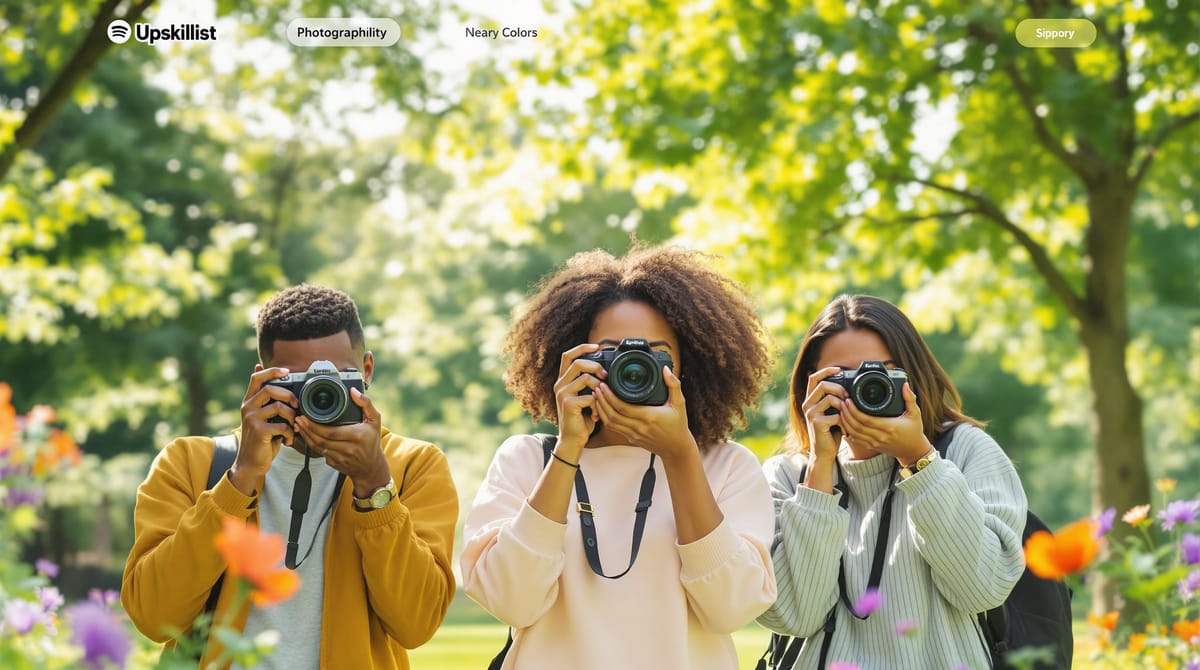Best Online Photography Courses for Beginners in 2025
Explore the best online photography courses for beginners in 2025, covering essential skills like camera settings, composition, and lighting.

Looking to learn photography from scratch? The best online courses in 2025 make it simple to understand essential skills like camera settings, composition, and lighting. Whether you’re using a smartphone or a DSLR, these courses provide structured lessons, practical assignments, and flexible schedules to help you improve at your own pace. Here’s a quick overview of top courses:
- Upskillist Photography for Beginners: 32 hours of content, hands-on projects, and certificates. Starts at $39.99/month after a free trial.
- Skillshare: DSLR Photography by Justin Bridges: A short 1-hour course covering the exposure triangle, manual settings, and editing basics.
- Coursera: Photography Basics and Beyond by Michigan State University: A comprehensive 5-course program with peer feedback and portfolio building.
- LinkedIn Learning: Photography Foundations by Ben Long: Focuses on composition, camera settings, and practical exercises.
Quick Comparison
| Course Name | Price | Duration | Certificate | Key Features |
|---|---|---|---|---|
| Upskillist Photography for Beginners | $39.99/month | 32 hours | Yes | Hands-on projects, expert assistance |
| Skillshare: DSLR Photography | $19/month or free trial | 1 hour | No | Short lessons, beginner-friendly |
| Coursera: Photography Basics | Free to audit | 2 months | Yes | Portfolio-based capstone project |
| LinkedIn Learning: Photography Foundations | $39.99/month | Self-paced | Yes | Composition-focused, mobile-friendly |
Choose a course based on your budget, schedule, and learning goals to start your photography journey today!
Learn Photography [Full Course] by Australian Geographic ...
Key Features of Beginner Photography Courses
When choosing a beginner photography course, look for features that align with your learning goals and the equipment you have. These courses typically focus on essential skills like camera use, exposure settings, and composition techniques.
Course Content Overview
Beginner courses generally start with the basics and may progress to more advanced topics. Key areas often include:
- How to operate your camera and adjust basic settings
- The exposure triangle: aperture, ISO, and shutter speed
- Principles of composition and framing
- Basics of lighting and color balance
- An introduction to photography styles such as portrait, landscape, and still life
Equipment Options
Courses are designed to cater to various levels of equipment. Here's how they typically break it down:
| Equipment Level | Requirements | Focus Areas |
|---|---|---|
| Smartphone | A recent model with manual controls | Composition, lighting, basic editing |
| Entry-level DSLR/Mirrorless | Camera body with a kit lens | Technical settings, exposure control |
| Any camera with manual settings | Manual controls available | Core photography principles |
Hands-On Learning Opportunities
Practical experience is a big part of most beginner photography courses. Expect features like:
- Guided Assignments: Step-by-step projects to apply what you've learned
- Real-Life Scenarios: Practice in different lighting conditions
- Technical Drills: Exercises to help you master camera settings
Supportive Learning Tools
Courses often include resources to enhance your learning experience, such as:
- Video tutorials demonstrating techniques
- Downloadable guides and reference materials
- Tools to track your progress
- Practice exercises with feedback options for improvement
Flexible Scheduling
Many courses are designed with flexibility in mind, offering features like:
| Feature | Benefit |
|---|---|
| Self-Paced Lessons | Learn at your own speed |
| Lifetime Access | Revisit materials whenever you want |
| Mobile Compatibility | Study on phones, tablets, or computers |
| Downloadable Content | Access materials offline |
Assessments and Recognition
To help you track your progress and showcase your skills, beginner courses often include:
- Regular progress reviews
- Opportunities to build a portfolio
- Certificates of completion
- Clearly defined learning goals
These features create a well-rounded learning experience, blending structure with opportunities for creative exploration.
1. Upskillist Photography for Beginners

Upskillist's Photography for Beginners course is taught by William Eames, a photographer with 20 years of experience. With up to 32 hours of learning material, this course is a solid starting point for anyone new to photography.
Course Structure and Content
The course blends theory with hands-on practice to create a well-rounded learning experience. Here's what it includes:
| Component | Details |
|---|---|
| Video Lessons | Tutorials covering camera basics |
| Practical Projects | Real-world assignments to build your portfolio |
| Assessment Tools | Free tools to monitor your progress |
| Support Resources | Downloadable guides and materials |
| Expert Assistance | Direct help from professionals |
This curriculum not only teaches photography skills but also provides certification to showcase your expertise.
Certification and Recognition
The course offers certificates for each completed module, which are recognized by educational institutions. It's a great way to validate your skills.
Learning Support System
With a community of 3 million photography students, the course provides award-winning support, including:
- Help with challenging concepts
- Regular progress tracking
- Access to extra learning materials
- Interactive tools for an engaging experience
Accessibility and Pricing
"At Upskillist, we believe in high-quality education at a low cost, which is why all of our photography courses include a free trial." – Upskillist
- Learn at your own pace
- Access up to 32 hours of content
- Monthly subscription priced at $39.99
- Lifetime access to all course materials
This setup equips students with skills useful for casual photography or professional growth.
2. iPhotography Beginner's Course
We couldn't find reliable, verified information about the iPhotography Beginner's Course. To maintain the accuracy and trustworthiness of our recommendations, we've chosen to remove this section. If verified details become available in the future, we'll update this article accordingly.
3. Skillshare: Fundamentals of DSLR Photography by Justin Bridges
Justin Bridges' DSLR photography course, lasting 1 hour and 19 minutes, simplifies the complexities of shutter speed, aperture, and ISO into easy-to-follow sections for beginners. The course is structured around practical modules, as outlined below:
| Module | Focus Area | Key Learning Outcomes |
|---|---|---|
| Camera Fundamentals | Exposure Triangle | Grasp how ISO, aperture, and shutter speed interact |
| Technical Skills | Manual Settings | Learn to use focus points, understand RAW vs. JPEG, and explore the focal plane |
| Practical Application | Studio & Outdoor Shooting | Hands-on examples of adjusting exposure settings in different environments |
| Post-Processing | Quick Editing | A 5-minute editing workflow focused on clarity, exposure, and contrast adjustments |
Through studio demonstrations, this course teaches how to control exposure: freeze or blur motion by adjusting shutter speed, create background blur using aperture, and manage ISO for low-light conditions.
Bridges also covers essential camera settings, suggests affordable gear options, and shows how simple post-processing tweaks - like adjusting clarity, exposure, and contrast - can dramatically improve your photos. This helps beginners make smart choices when starting their photography journey.
The course dives into shooting in various settings, including studio photography with controlled lighting, outdoor shots using manual and TV modes, product photography in tricky lighting conditions, and portrait photography with precise focus techniques.
4. Coursera: Photography Basics and Beyond by Michigan State University

This photography program from Michigan State University offers a well-organized learning experience with five interconnected courses. With over 336,000 participants and a 4.8-star rating, it’s designed to take about two months if you dedicate 10 hours per week. Here's what the program covers:
| Course | Topics Covered | Skills Gained |
|---|---|---|
| Cameras, Exposure, and Photography | Camera functions, framing, accessories | Technical basics, creative vision |
| Camera Control | Exposure modes, ISO, lens choices | Mastery of manual settings |
| Photo Composition | Design principles, Adobe Lightroom intro | Editing and composition skills |
| Photography Techniques | Lighting (natural and artificial), content creation | Advanced shooting techniques |
| Capstone Project | Building a 10-photo portfolio | Project planning and execution |
The courses are structured to build knowledge step by step, preparing students for hands-on projects and portfolio creation.
Students participate in practical assignments, including:
- Submitting work to a web gallery for peer feedback
- Completing real-world shooting tasks
- Gradually advancing through skill-focused exercises
- Developing a portfolio with guided critiques
The program is flexible regarding equipment, catering to both smartphone and DSLR users. Graduates earn a certificate from Michigan State University and can access discounts on gear through industry partnerships.
"Throughout the project, learners share their work-in-progress, from the initial Project Plan to the final Portfolio, and provide each other with comments and suggestions. This process includes multiple opportunities for sharing pictures and ideas through carefully designed Peer Review."
With new modules introduced every two weeks, the curriculum keeps the pace engaging while reinforcing both technical and creative skills. The combination of hands-on practice and peer interaction helps beginners grow their confidence and expertise.
5. Udemy: Photography Masterclass for Beginners
This section has been temporarily removed as the course details are currently unverified. Updates will be provided once accurate information is confirmed.
6. Domestika: Photography for Beginners by Maria Svarbova

Next on our list is a beginner-friendly photography course by Maria Svarbova, available on Domestika. While the course details are still being finalized, check back soon for a full breakdown of what it offers and its standout features.
7. LinkedIn Learning: Photography Foundations

The Photography Foundations course on LinkedIn Learning, taught by photographer Ben Long, focuses on teaching key photography skills with an emphasis on composition and technical precision.
The course covers fundamental concepts like balance, symmetry, the rule of thirds, perspective, lines and shapes, repetition, and how to use foreground and background elements effectively. It also explores the role of light and shadows in creating impactful images.
Students dive into core camera settings - shutter speed, aperture, and ISO - to capture properly exposed photos. Practical exercises and in-depth composition breakdowns are included to help sharpen visual skills.
Additional features like downloadable exercises, interactive quizzes, and mobile-friendly access make learning convenient. The course also touches on photo editing and exposure techniques, such as using light meters, reading histograms, adjusting brightness, and avoiding blur.
While the course is suitable for any digital camera, it’s particularly effective for those using DSLRs or mirrorless models. This structured program is a great starting point for beginners looking to build a strong photography foundation.
Course Features at a Glance
Here’s a quick comparison of the main features of each course to help you find the right fit. These programs are designed for beginner photographers, offering structured lessons and hands-on assignments to build essential skills.
| Course Name | Price | Duration | Certificate | Key Features |
|---|---|---|---|---|
| Upskillist Photography for Beginners | 7-day free trial, then subscription | Lifetime access | Yes | • AI-powered tools • Interactive online classes • Ongoing assessments • Taught by industry professionals |
| The School of Photography – Beginners Photography Course | Membership: $19/mo or $165/yr, or one-time $115 | Lifetime access | Yes | • Multiple payment options • Beginner-focused curriculum |
| Coursera: Photography Basics and Beyond | Free to audit | Self-paced | Yes | • Peer-reviewed assignments • Portfolio-based capstone project • University-level instruction |
Coursera stands out with peer-reviewed assignments and a portfolio-focused capstone project, while The School of Photography offers flexible payment plans for those on a budget. Upskillist adds value with AI-powered tools and interactive classes.
All three courses allow you to learn at your own pace and cater to beginners with clearly outlined lessons. When choosing, think about factors like access to course materials, practical assignments, instructor interaction, and mobile compatibility. Select the course that aligns with your learning preferences, schedule, and budget to kickstart your photography journey with confidence.
Tips for Success in Online Photography Classes
Learning photography online can be exciting and rewarding. Here are some practical tips to help you make the most of your classes:
-
Get Comfortable with Your Camera
Spend time testing your camera in different lighting conditions. Take notes on what works best so you can quickly adjust settings when needed. -
Vary Your Shooting Locations
Practice shooting in a mix of indoor and outdoor settings. This will help you get used to different lighting scenarios and build a more versatile portfolio. -
Try New Angles
Play around with perspectives like bird's-eye, eye-level, or low-angle shots. Changing your viewpoint can lead to creative and unexpected results.
Next Steps
Choose a photography course that fits your needs by following these steps:
-
Evaluate Your Current Skills
Think about where you’re starting. If you’re completely new, look for courses that teach the basics - like exposure, aperture, and ISO. If you already know the fundamentals, focus on options that dive into composition or advanced techniques. -
Set Your Photography Goals
What’s your reason for learning photography?- If it’s for career growth, pick courses that provide certifications or help you build a portfolio.
- If it’s just for fun, go for flexible, self-paced programs.
- Want to specialize? Find courses tailored to areas like portrait or landscape photography.
-
Match Your Learning Style
Different courses cater to different learning preferences. Here’s a quick guide:
| Learning Style | Best Course Features |
|---|---|
| Prefer structure | Fixed schedules and live instructor feedback |
| Like flexibility | On-demand lessons with no strict deadlines |
| Hands-on learner | Assignments and peer reviews for practical experience |
- Check Equipment Needs
Pick a course that works with what you already have:- A smartphone with a camera
- A basic DSLR or mirrorless camera
- Simple editing software
Start with your current gear and focus on learning how to use it well before upgrading. These steps will help you quickly zero in on the right course for you.

